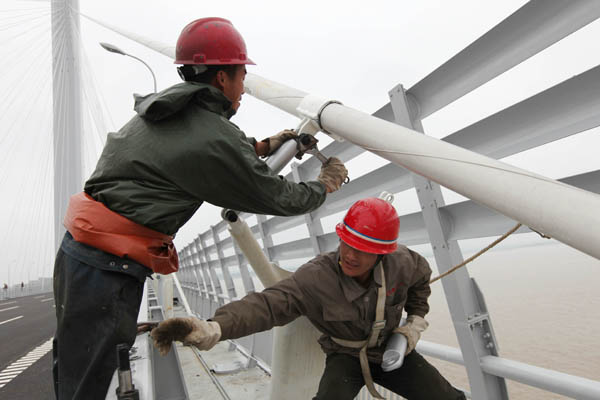Local spending raises concern
Updated: 2013-08-15 23:33
By Zheng Yangpeng (China Daily)
|
|||||||||||
For the central government, it is time for cautious mini-stimulus. But in reality, some local governments may be making mini-stimulus into, once again, a campaign for building huge public projects on huge investment and huge borrowing.
Experts said they worry that some of these projects aren't commercially viable. They urged an overhaul of China's local financing system.
 |
|
Workers fasten cables on the Jiaxing-Shaoxing bridge in Zhejiang province. Some local governments still see big-ticket infrastructure projects such as rail lines and urban renewal programs as a way to shore up economic growth.Shen Da / for China Daily |
Just this past Sunday, Chongqing municipality approved the construction of a 51-kilometer urban rail line. The line is scheduled for completion by 2018, with total investment of 31.4 billion yuan ($5.13 billion).
Another local rail line costing 4.1 billion yuan also passed preliminary evaluations.
A few days earlier, Northwest China's Gansu province approved a feasibility study for the first subway line in the capital city, Lanzhou. The project would cost 18.9 billion yuan.
Citing Zhu Maokun, former chief engineer of the Ministry of Railways, which is now named China Railway Corp, the 21st Century Business Herald reported that 36 cities have approved the construction of urban rail projects.
By 2020, there will be nearly 6,000 km of urban rail systems in China, and total investment could hit 4 trillion yuan.
While domestic media were quick to characterize the urban rail construction boom as a localized version of a "stimulus program", experts said projects should be weighed on a case-by-case basis.
"These cities, such as Chongqing, Lanzhou and Kunming are large by Western standards. The concentration of population makes it viable to build an urban rail transit," said Shi Hongxiu, a public finance professor with the Chinese Academy of Governance.
He said as China's urbanization proceeds, urban rail projects, as well as flood control and sewage systems, will be in great demand. Grouping all of these under the umbrella of "stimulus" spending might be misleading, he said.
Related Stories
Local governments' fiscal revenue growth slows 2013-08-08 06:38
Be careful of local government debt 2013-08-05 21:15
No crisis over local governments' debts 2013-08-02 07:26
Audit targets local government debt 2013-07-29 07:07
Local government debt must be properly supervised 2013-07-15 20:49
Local governments face financing woes 2013-07-15 07:10
Today's Top News
No remorse as Abe marks surrender anniversary
Xi, Putin to meet at G20 Summit
Beijing, Moscow hail military ties
China to be No 1 purchaser
China summons Japanese ambassador
Fish ecosystem on verge of collapse
Five-year plan to treat water, soil losses
Public rental housing fund launched
Hot Topics
Lunar probe , China growth forecasts, Emission rules get tougher, China seen through 'colored lens', International board,
Editor's Picks

|

|

|

|

|

|





